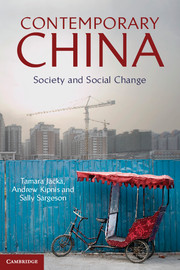Book contents
- Frontmatter
- Contents
- List of Images
- List of Maps
- List of Figures
- List of Tables
- Acknowledgments
- List of Abbreviations
- Map 0.1: China's provinces and provincial capitals
- Introduction
- Part 1 Social Institutions
- 1 Families, Kinship and Relatedness
- 2 Marriage, Intimacy and Sex
- 3 Citizenship, Household Registration and Migration
- 4 Community Institutions
- 5 Work
- Part 2 Cultures, Socialization and the Formation of Identities
- Part 3 Inequalities, Injustices and Social Responses
- Glossary of Chinese Terms
- References
- Index
3 - Citizenship, Household Registration and Migration
Published online by Cambridge University Press: 05 June 2014
- Frontmatter
- Contents
- List of Images
- List of Maps
- List of Figures
- List of Tables
- Acknowledgments
- List of Abbreviations
- Map 0.1: China's provinces and provincial capitals
- Introduction
- Part 1 Social Institutions
- 1 Families, Kinship and Relatedness
- 2 Marriage, Intimacy and Sex
- 3 Citizenship, Household Registration and Migration
- 4 Community Institutions
- 5 Work
- Part 2 Cultures, Socialization and the Formation of Identities
- Part 3 Inequalities, Injustices and Social Responses
- Glossary of Chinese Terms
- References
- Index
Summary
Outside the family, some of the most significant institutions in societies are those that categorize people and establish principles of inclusion and exclusion and stratification between the categories. Among the most fundamental of such institutions in the modern world is citizenship, which draws sharp distinctions between citizens who enjoy rights and privileges by virtue of being legally recognized as permanent residents of a nation, and non-citizens who do not enjoy such rights because they are legally defined as foreigners or temporary residents.
In 1950, the sociologist TH Marshall wrote an influential paper about the historical evolution of citizenship in Britain. In this, he argued that institutions of citizenship established, and partially fulfilled, a social expectation for the amelioration of the class inequalities between citizens that capitalism had created. Marshall wrote that this did not happen all at once, and in the 18th and 19th centuries, civil rights
gave legal powers whose use was drastically curtailed by class prejudice and lack of economic opportunity. Political rights gave potential power whose exercise demanded experience, organization and a change of ideas as to the proper functions of government … Social rights were at a minimum and were not woven into the fabric of citizenship.
In the 20th century, however, state provision of social rights in the form of public education and a national welfare system acquired a new meaning. No longer merely “an attempt to abate the obvious nuisance of destitution in the lowest ranks of society”, this provision began to reshape the whole structure of social inequalities and, Marshall predicted, “might even end by converting a skyscraper into a bungalow”.
- Type
- Chapter
- Information
- Contemporary ChinaSociety and Social Change, pp. 65 - 82Publisher: Cambridge University PressPrint publication year: 2013

